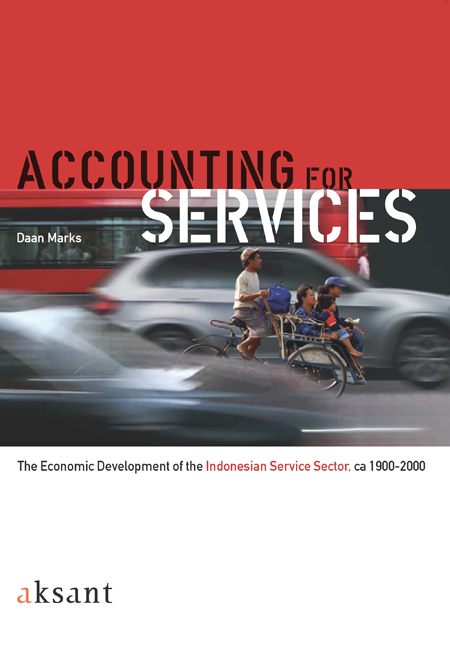Book contents
- Frontmatter
- Contents
- List of Tabels
- Acknowledgement
- 1 Introduction
- 2 National Accounting for Services in Indonesia
- 3 The Development of the Indonesian Service Sector: A Quantitative Analysis
- 4 Roads to Riches? Transportation and Economic Development in Indonesia
- 5 Involution and Growth: the Ambiguous Role of the Trade Sector in the Economic Development of Indonesia
- 6 Unity or Diversity?: Market Integration through Trade and Transport
- 7 Conclusions
- Appendices
- References
1 - Introduction
Published online by Cambridge University Press: 19 January 2021
- Frontmatter
- Contents
- List of Tabels
- Acknowledgement
- 1 Introduction
- 2 National Accounting for Services in Indonesia
- 3 The Development of the Indonesian Service Sector: A Quantitative Analysis
- 4 Roads to Riches? Transportation and Economic Development in Indonesia
- 5 Involution and Growth: the Ambiguous Role of the Trade Sector in the Economic Development of Indonesia
- 6 Unity or Diversity?: Market Integration through Trade and Transport
- 7 Conclusions
- Appendices
- References
Summary
THE CONTEXT
In the lecture Simon Kuznets delivered in Stockholm when he received the Nobel Prize in Economic Sciences in 1971, he encouraged researchers not to concentrate only on industrial countries but to analyse less developed countries (LDCS) as well.
‘For the less developed countries the tasks of economic research are somewhat different: the great need is for a wider supply of tested data, which means essentially data that have been scrutinised in the process of use for economic analysis. […] One may hope, but with limited expectations, that the tasks of refining analysis and measurement in the developed countries will not be pursued to the exclusion or neglect of badly needed studies of the less developed countries, studies that would deal with the quantitative bases and institutional conditions of their performance, in addition to those concentrating on what appear to be their major bottlenecks and the seemingly optimal policy prescriptions.’ (Kuznets 1973: 258)
By now more than 35 years have passed and a growing number of researchers – some perhaps encouraged by Kuznets – have studied the less developed countries and constructed databases to meet the quantitative needs that Kuznets refers to. This has resulted in quite an impressive body of literature. However, there are still some important gaps to fill. One theme that has not yet received the attention it deserves is the role of the service sector in the economic development of LDCS. As economist Dorothy Riddle argues in her in-depth study on the service sector:
‘Development economists characteristically view services as a “developed” country issue, of little concern to developing nations. The excitement, the dynamism, the key to growth is believed to lie in the manufacturing sector.’ (Riddle 1986: 1)
The reason for this is probably that the service sector is often considered to be subordinate. At the beginning of the process of economic development, agriculture is the most important sector. Initially, with low levels of productivity, there is little if any surplus above the subsistence requirements, so that economic activity of most members of society falls into the primary sector. As agricultural techniques improve, productivity rises and the size of the surplus grows, enabling the development of a manufacturing or secondary sector, which produces both equipment and consumer goods to satisfy some less basic needs over and above subsistence levels.
- Type
- Chapter
- Information
- Accounting for ServicesThe Economic Development of the Indonesian Service Sector, ca 1900–2000, pp. 17 - 40Publisher: Amsterdam University PressPrint publication year: 2009



